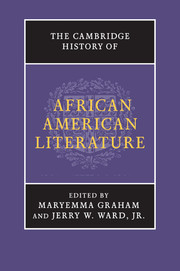Book contents
- Frontmatter
- Introduction
- PART I AFRICAN AMERICAN LITERATURE FROM ITS ORIGINS TO THE TWENTIETH CENTURY
- 1 Sounds of a tradition: the souls of black folk
- 2 Early print literature of Africans in America
- 3 The emergence of an African American literary canon, 1760–1820
- 4 Dividing a nation, uniting a people: African American literature and the abolitionist movement
- 5 African American literature and the abolitionist movement, 1845 to the Civil War
- 6 Writing freedom: race, religion, and revolution, 1820–1840
- 7 “We wish to Plead our own Cause”: independent antebellum African American literature, 1840–1865
- 8 Racial ideologies in theory and practice: political and cultural nationalism, 1865–1910
- 9 The “fictions” of race
- 10 “We Wear the Mask”: the making of a poet
- 11 Toward a modernist poetics
- PART II AFRICAN AMERICAN LITERATURE IN THE TWENTIETH CENTURY
- PART III AFRICAN AMERICAN LITERATURE AS ACADEMIC AND CULTURAL CAPITAL
- Bibliography
- Index
- References
8 - Racial ideologies in theory and practice: political and cultural nationalism, 1865–1910
from PART I - AFRICAN AMERICAN LITERATURE FROM ITS ORIGINS TO THE TWENTIETH CENTURY
Published online by Cambridge University Press: 28 May 2011
- Frontmatter
- Introduction
- PART I AFRICAN AMERICAN LITERATURE FROM ITS ORIGINS TO THE TWENTIETH CENTURY
- 1 Sounds of a tradition: the souls of black folk
- 2 Early print literature of Africans in America
- 3 The emergence of an African American literary canon, 1760–1820
- 4 Dividing a nation, uniting a people: African American literature and the abolitionist movement
- 5 African American literature and the abolitionist movement, 1845 to the Civil War
- 6 Writing freedom: race, religion, and revolution, 1820–1840
- 7 “We wish to Plead our own Cause”: independent antebellum African American literature, 1840–1865
- 8 Racial ideologies in theory and practice: political and cultural nationalism, 1865–1910
- 9 The “fictions” of race
- 10 “We Wear the Mask”: the making of a poet
- 11 Toward a modernist poetics
- PART II AFRICAN AMERICAN LITERATURE IN THE TWENTIETH CENTURY
- PART III AFRICAN AMERICAN LITERATURE AS ACADEMIC AND CULTURAL CAPITAL
- Bibliography
- Index
- References
Summary
The years following the conclusion of the Civil War and extending to the initial rumblings of what would come to be known as the Harlem Renaissance, roughly 1865–1910, can perhaps be characterized by the Dickensian binary opposition “The best of times, the worst of times.” The euphoria and celebratory mood associated with the end of the Civil War was soon interrupted by the assassination of Abraham Lincoln, but was recaptured, though not without continued vigilance and hard work, by the subsequent ratification of the Thirteenth, Fourteenth, and Fifteenth Amendments to the United States Constitution in 1865, 1868, and 1870 respectively. In addition, the Freedmen's Bureau, organized immediately following the conclusion of the war, was charged with attending to the immediate needs of the newly freed slaves, many of whom did not have the wherewithal to supply themselves with the basic needs of food, clothing, and shelter. The Bureau met with some success, but the organization under the leadership of former Union Army General O. O. Howard had its share of detractors who prevented it from completing its mission.
Indeed, freedom and its exercise by millions of African Americans who had been previously enslaved took on many different forms, from presiding over confiscated lands of former slaveholders, and free movement to other geographical locations, to freely participating in constitutional conventions and the electoral process that enabled a number of African Americans to hold public offices.
- Type
- Chapter
- Information
- The Cambridge History of African American Literature , pp. 154 - 176Publisher: Cambridge University PressPrint publication year: 2011



